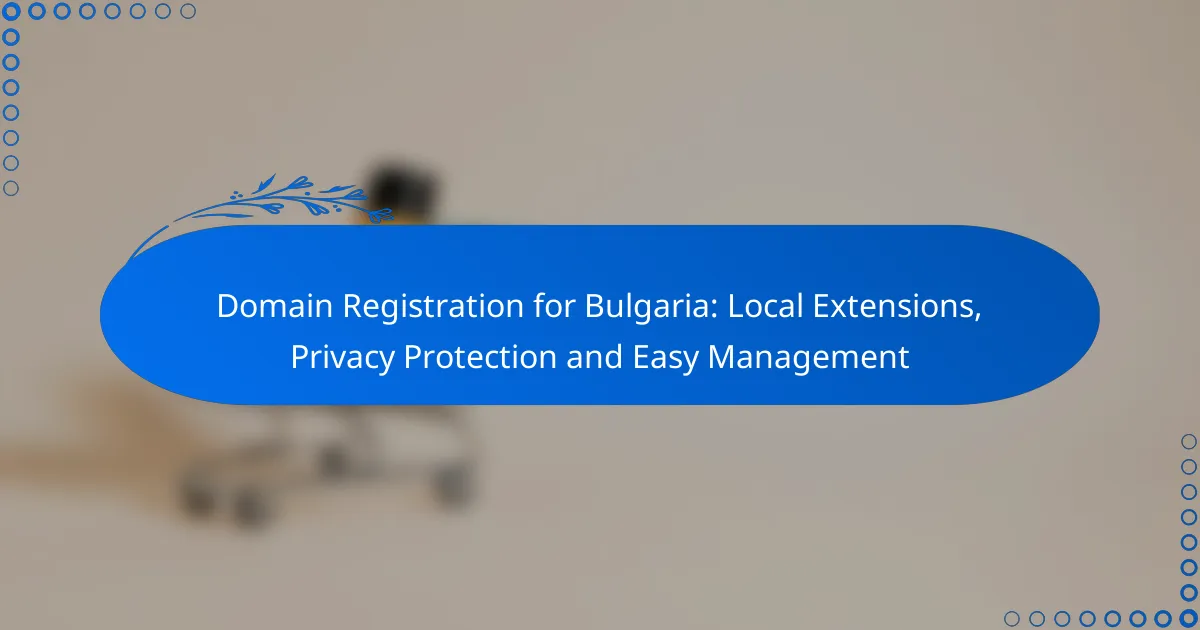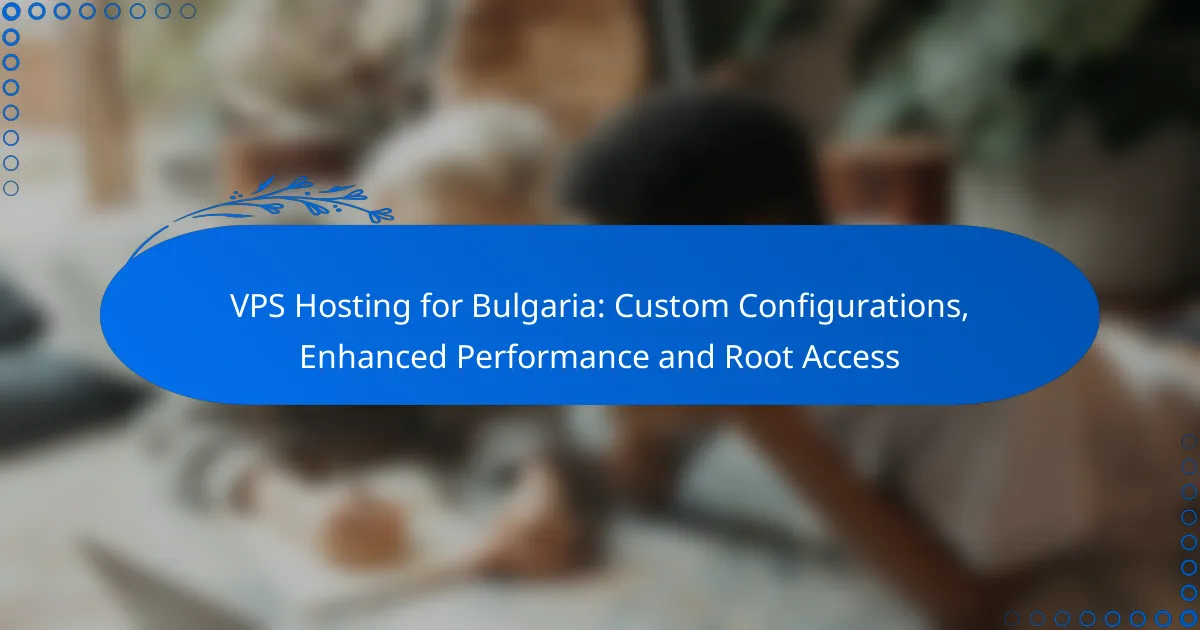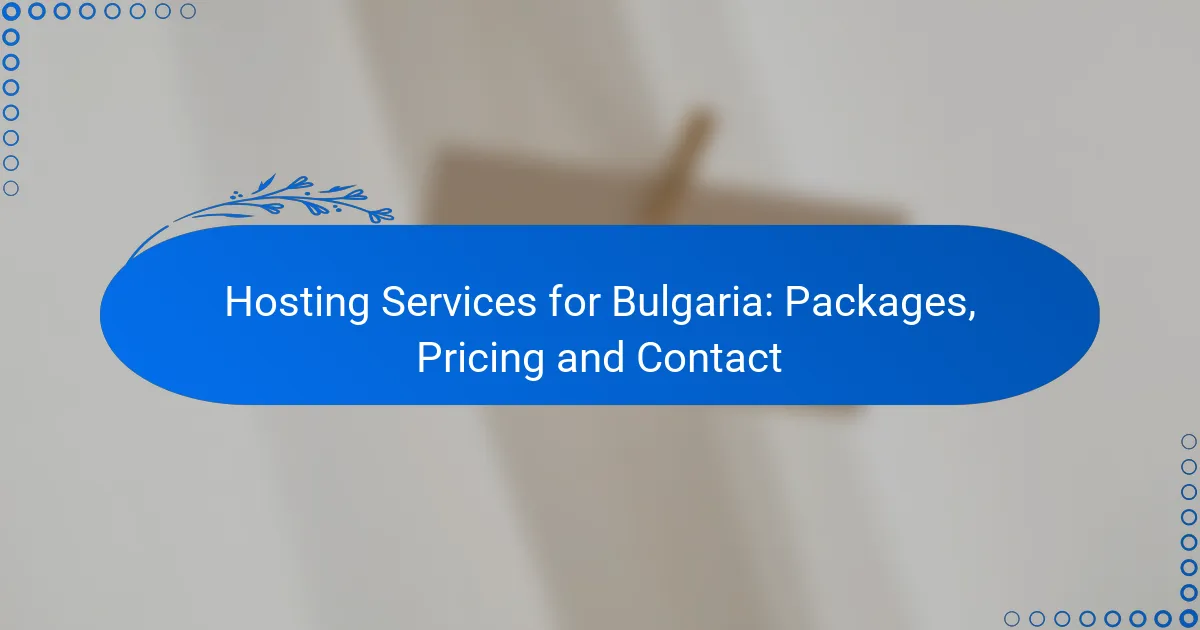Domain registration in Bulgaria offers a straightforward process for securing local extensions like .bg, .eu, and .com. Key considerations include privacy protection, compliance with legal requirements, and effective management tools. Understanding these aspects helps businesses establish a credible online presence tailored to their target audience.
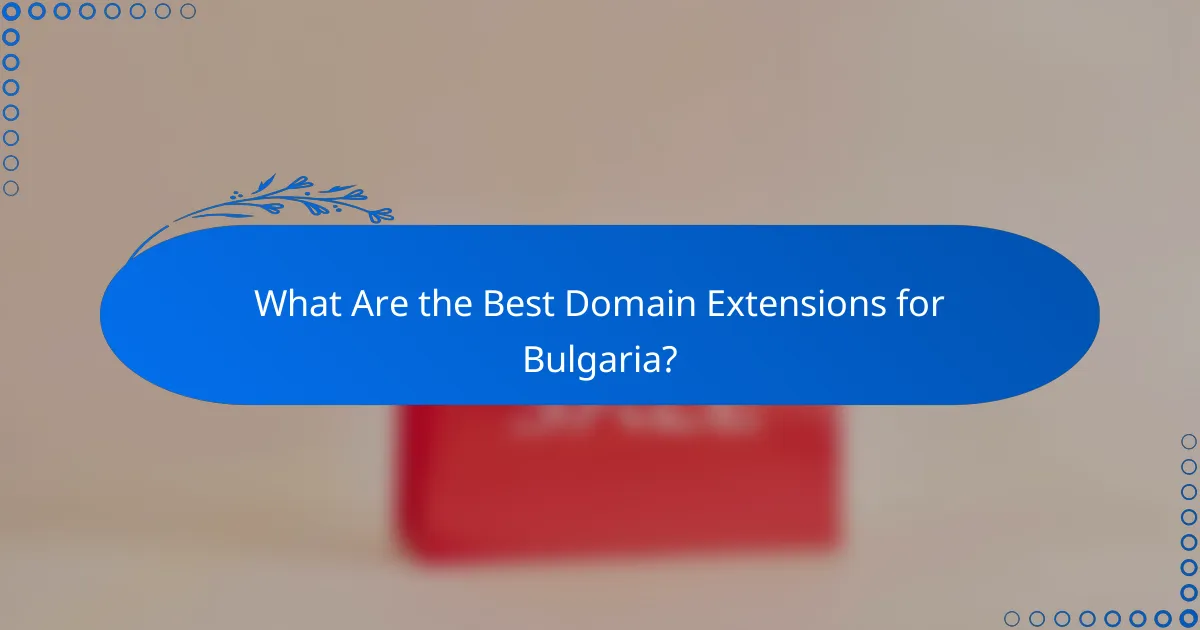
What Are the Best Domain Extensions for Bulgaria?
Choosing the right domain extension is essential for building a strong online presence in Bulgaria. The most popular options are .bg, .eu, and .com, each catering to different audiences and purposes. For example, about 70% of local businesses prefer the .bg extension, while .eu and .com target broader markets, with .com being the most recognized worldwide.
The .bg extension is designed for Bulgarian entities, helping local businesses connect with domestic consumers. In contrast, .eu serves businesses within the European Union, appealing to a wider audience across member states. The globally recognized .com extension is perfect for companies seeking international reach, with over 150 million registered .com domains globally.
Understanding these extensions enables businesses to align their online identity with their target market, boosting credibility and fostering consumer trust.
.bg Domain Extension
The .bg domain extension is Bulgaria’s official country code top-level domain (ccTLD), primarily used by local businesses, organizations, and individuals. As of 2023, over 120,000 .bg domains are registered, showcasing its popularity among Bulgarian entities.
To register a .bg domain, proof of local presence is often required, such as a registered business or personal identification, including a national ID or business registration certificate. This regulation ensures that only legitimate Bulgarian entities use the domain, reinforcing consumer trust.
Having a .bg domain significantly enhances trust among local customers, signaling a commitment to the Bulgarian market and culture, which helps businesses connect more effectively with their audience.
.eu Domain Extension
The .eu domain extension represents the European Union and is available to individuals and organizations within EU member states. It fosters a European identity and is ideal for businesses targeting a broader European audience, with over 3 million .eu domains registered as of 2023.
Registration is straightforward, requiring proof of residency or business operations within the EU, such as a VAT number or business license. This extension is particularly advantageous for companies aiming to establish a pan-European presence, allowing them to engage diverse markets across the continent.
Using a .eu domain can enhance visibility in EU markets and demonstrate compliance with European regulations, increasingly important for customers who prioritize businesses adhering to local laws.
.com Domain Extension
The .com domain extension is the most recognized and widely used globally, with over 150 million registrations, making it suitable for businesses seeking an international audience. It imposes no geographical restrictions, allowing companies from anywhere in the world to register.
Registration for a .com domain is simple and does not require any local presence, making it accessible to anyone globally. This flexibility enables businesses to reach a global market, significantly expanding their potential customer base.
Having a .com domain boosts brand recognition and credibility, especially for companies aiming for international expansion, as it is often seen as a standard for a professional online presence.
Comparison of Local Extensions
| Extension | Target Audience | Registration Requirements | Market Focus |
|---|---|---|---|
| .bg | Local | Local presence | Bulgarian market |
| .eu | European | EU residency or business | EU markets |
| .com | Global | No restrictions | International |
Benefits of Local Extensions
Local domain extensions like .bg and .eu provide several advantages for businesses in Bulgaria. First, they enhance local credibility, making customers 60% more likely to trust a business with a local domain compared to generic alternatives.
Second, local extensions can improve search engine rankings within their regions, as search engines often prioritize local domains for local queries, potentially increasing organic traffic by up to 30% for businesses using local extensions.
Additionally, adopting a local extension fosters a sense of community and connection with customers, reinforcing the brand’s commitment to the local market and encouraging customer loyalty. This connection is vital for businesses aiming to thrive in a competitive landscape.
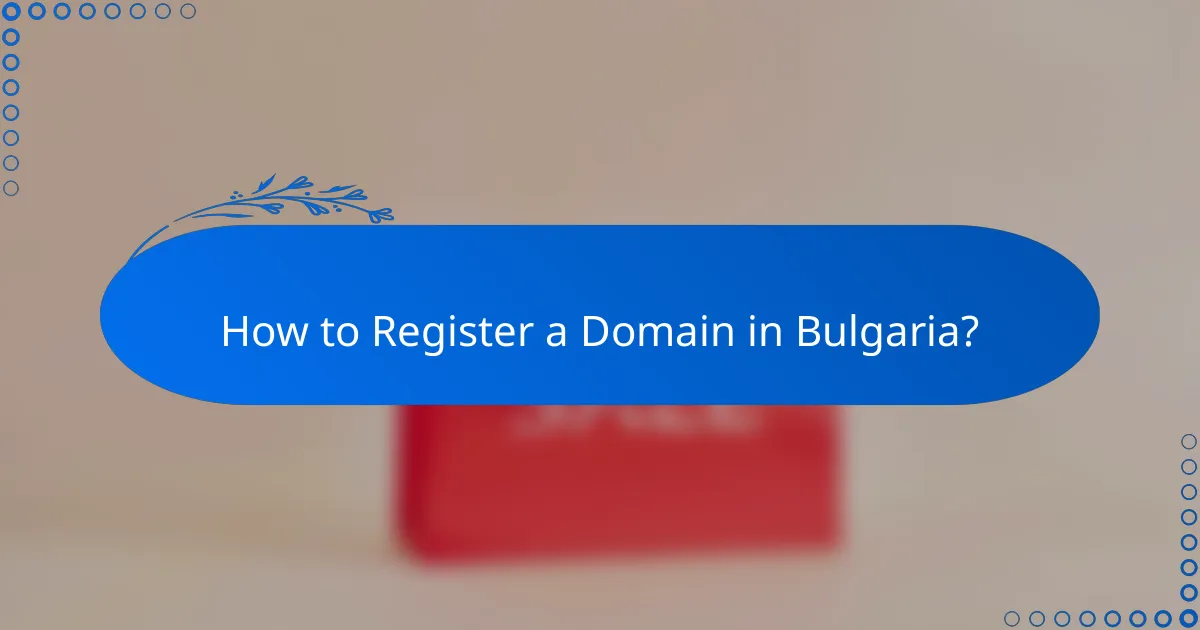
How to Register a Domain in Bulgaria?
Registering a domain in Bulgaria is a simple online process that usually takes a few hours to a few days. Key steps include selecting a unique domain name, choosing a reputable registrar, and providing necessary documentation. Familiarizing yourself with local regulations is essential, as non-compliance can lead to delays or rejection.
Start by choosing a domain name that accurately represents your brand or business. It should be unique and memorable, ideally incorporating keywords relevant to your industry to boost search engine visibility. Once you have a name, select a registrar that offers the services you need, such as domain privacy and customer support.
After selecting a registrar, complete the application form on their website. This form typically requires details about the domain name, your personal or business information, and any additional services you may want, like hosting or email accounts. Double-check all information for accuracy, as errors can cause processing delays.
Once your application is submitted, the registrar will process your request, which usually takes a few hours to a few days. You’ll receive a confirmation email once your domain is successfully registered, enabling you to start building your online presence and enhancing your brand visibility.
The domain registration process in Bulgaria involves several essential steps. Begin by researching available domain names to ensure they are not already taken; registrars provide tools to quickly check the availability of your desired name. This initial research is crucial, as around 50% of desired domain names may already be registered.
Next, choose a reputable registrar operating in Bulgaria. Look for one that offers competitive pricing, excellent customer support, and additional services like privacy protection to safeguard your personal information. After selecting a registrar, create an account on their platform, which typically requires an email address and password.
Fill out the registration form with your chosen domain name and your personal or business details. Carefully review the terms and conditions, then proceed to make the payment. The registration fee for a .bg domain typically ranges from €10 to €30 per year. Finally, confirm your registration through the email sent by the registrar, which will include important details about your domain.
To register a domain in Bulgaria, specific documents are required to verify your identity. Individuals usually need a valid ID or passport, while businesses may need to provide a registration certificate or tax identification number. These documents are vital for compliance with local regulations.
Additionally, you may need to provide proof of address, such as a utility bill or bank statement, to confirm your residency or business location. Some registrars might also request a signed agreement or acknowledgment of terms of service, which can vary by provider. Having these documents ready can speed up the registration process and minimize potential delays.
The cost of registering a domain in Bulgaria varies based on several factors, including the registrar and the type of domain extension. Local extensions like .bg may have different pricing compared to international ones like .com, which can range from €10 to €50 annually. Understanding these costs is essential for budgeting your online presence.
On average, registration fees for a .bg domain range from €10 to €30 per year. Additional services, such as privacy protection or web hosting, may incur extra charges, potentially totaling €100 or more annually. It’s crucial to review the pricing structure of your chosen registrar before proceeding to ensure you are aware of all potential costs.
Some registrars may offer discounts for multi-year registrations or bundled services, which can save you money in the long run. Always compare prices and features to find the best deal for your needs, as some registrars may provide promotional offers that significantly reduce your initial costs.
Several registrars operate in Bulgaria, offering a variety of domain registration services. Among the most popular options is Register.bg, known for its user-friendly interface and competitive pricing, starting as low as €10 per year.
Another well-regarded registrar is Host.bg, which provides comprehensive services, including web hosting and email solutions, making it a one-stop shop for online needs. BGdomen.com is also a popular choice, especially for those seeking local support and guidance, invaluable for first-time registrants.
When selecting a registrar, consider factors such as customer reviews, support availability, and additional services offered. This will help ensure a smooth registration experience and effective ongoing management of your domain, allowing you to focus on building your online presence.
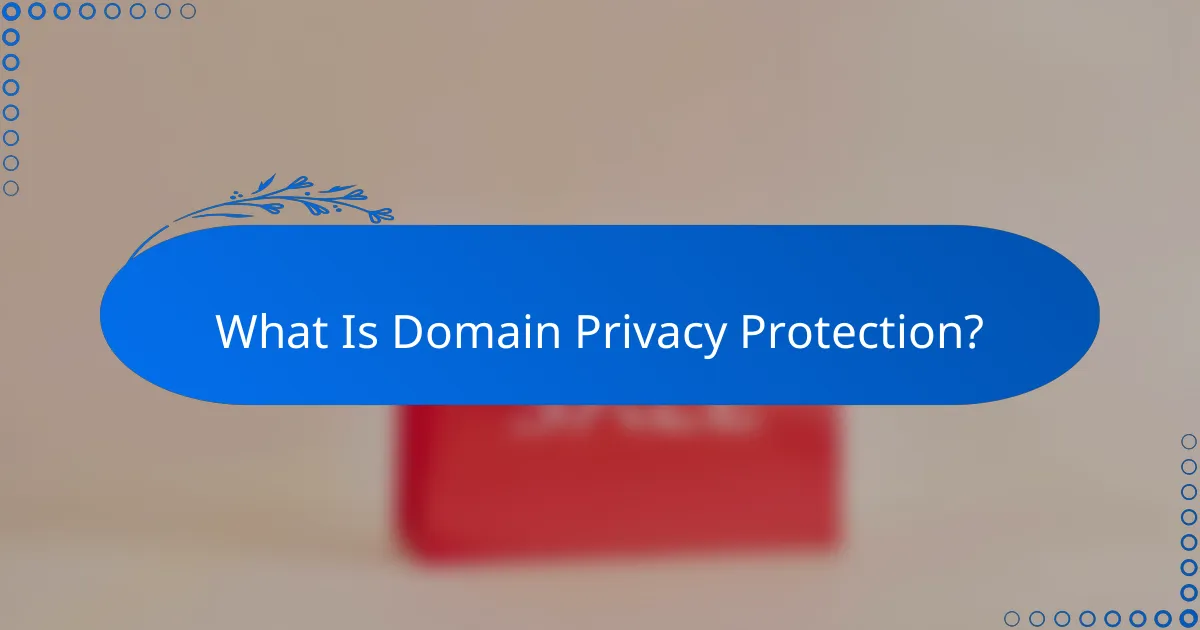
What Is Domain Privacy Protection?
Domain privacy protection is a service that keeps your personal information hidden from public view. When you register a domain, your contact details usually appear in the WHOIS database, accessible to anyone online. This service replaces your personal information with that of a forwarding service, ensuring that the WHOIS record displays the registrar’s information instead of your name and address. By using domain privacy protection, you can significantly lower the risk of spam, identity theft, and unwanted solicitations, making it essential for individuals and businesses that value their online privacy.
Definition of Domain Privacy
Domain privacy effectively conceals the registrant’s personal information from public databases, including sensitive details like name, address, email, and phone number. For instance, when someone searches for a domain in the WHOIS database, they encounter the registrar’s information rather than the owner’s, preserving anonymity. This feature is vital for both individuals and businesses, safeguarding sensitive information from misuse and ensuring your online identity remains secure and private, which fosters trust and credibility in the digital marketplace.
Importance of Privacy Protection
In today’s digital landscape, privacy protection is increasingly crucial, as personal data is often exploited. Keeping your information private can reduce various risks, including identity theft, which impacted over 14 million Americans in 2019 alone. Additionally, it helps minimize spam and unwanted marketing emails; without privacy protection, your contact details can be harvested by spammers and scammers, resulting in a flood of unsolicited communications. Furthermore, maintaining privacy can enhance your brand’s reputation, as customers are more likely to trust businesses that prioritize their privacy and security, ultimately influencing their purchasing decisions.
How It Works
Domain privacy protection works by replacing your personal information with that of a proxy service. When someone queries the WHOIS database, they see the proxy’s details instead, effectively shielding your identity. This process typically involves a simple opt-in during domain registration, with most registrars offering an easy option to add this feature. Once activated, the proxy service forwards any inquiries to your actual contact information, ensuring you remain reachable while keeping your details confidential, a crucial aspect of maintaining a secure online presence.
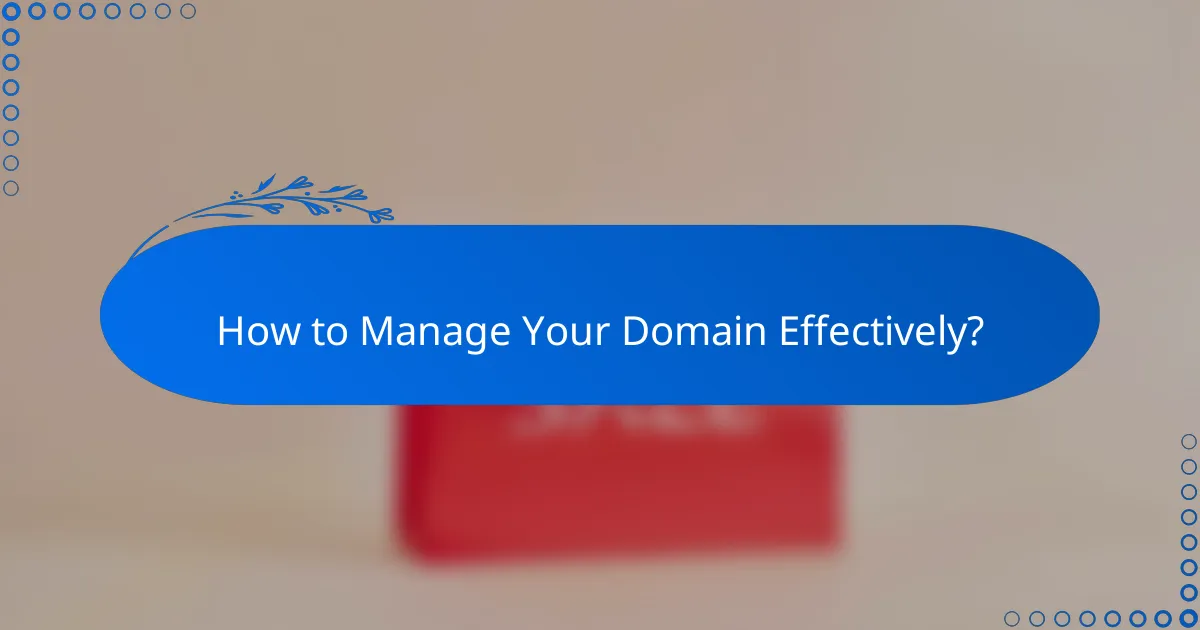
How to Manage Your Domain Effectively?
Domain management tools are vital for overseeing your domain portfolio, especially with over 360 million registered domains worldwide as of 2023. These tools enable seamless registration, renewal, and transfer of domains, ensuring your online presence remains uninterrupted.
Domain Management Tools
Popular platforms like GoDaddy, Namecheap, and Google Domains each attract millions of users with unique features such as bulk management, DNS settings, and domain forwarding. GoDaddy’s user-friendly interface simplifies managing multiple domains, while Namecheap stands out for its competitive pricing and excellent customer support. Leveraging these tools can streamline your domain operations, saving time and minimizing the risk of costly errors.
Best Practices for Domain Management
Effective domain management requires adherence to best practices for security and accessibility. Regularly updating your contact information and DNS records is essential; studies reveal that 30% of domain owners fail to keep their information current, risking challenges in domain recovery.
Renewal Process
Implementing two-factor authentication (2FA) enhances security, reducing unauthorized access by up to 99%. Additionally, keep a record of all domain expiration dates to avoid unintentional loss of ownership, as 20% of domains expire due to oversight. Using a consistent naming convention for your domains simplifies management and boosts brand recognition, making it easier for customers to find you online.
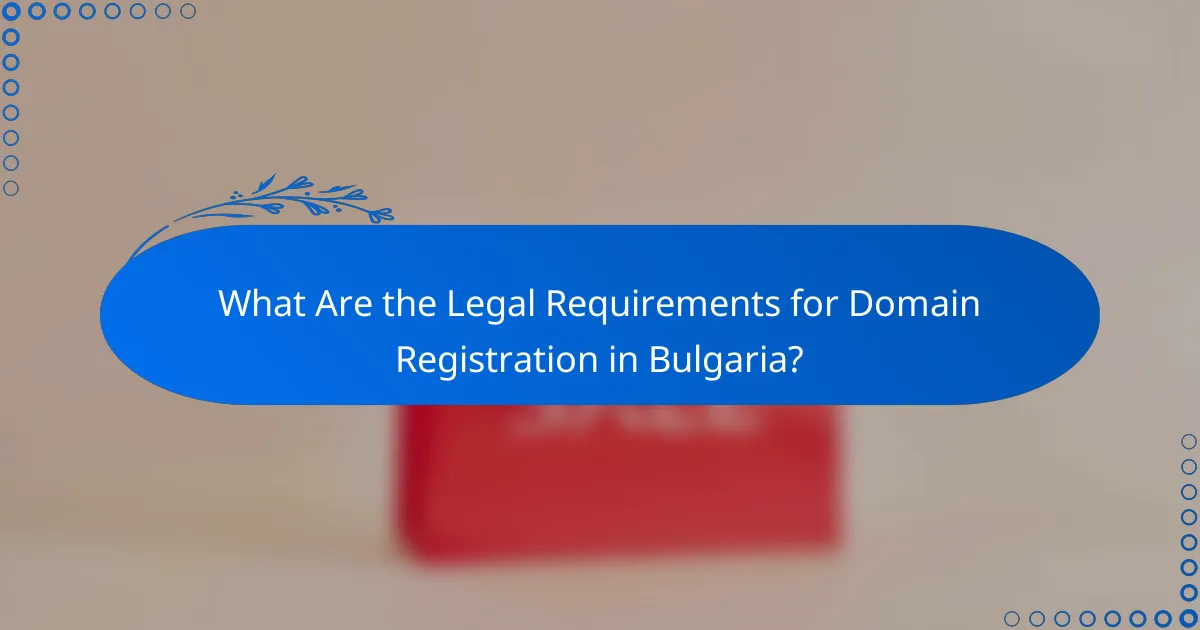
What Are the Legal Requirements for Domain Registration in Bulgaria?
To register a domain in Bulgaria, you must meet specific legal requirements. These include a valid identification document, such as a national ID or passport, and a registered address within Bulgaria, whether residential or business. This ensures that the registrant can be easily contacted and verified.
